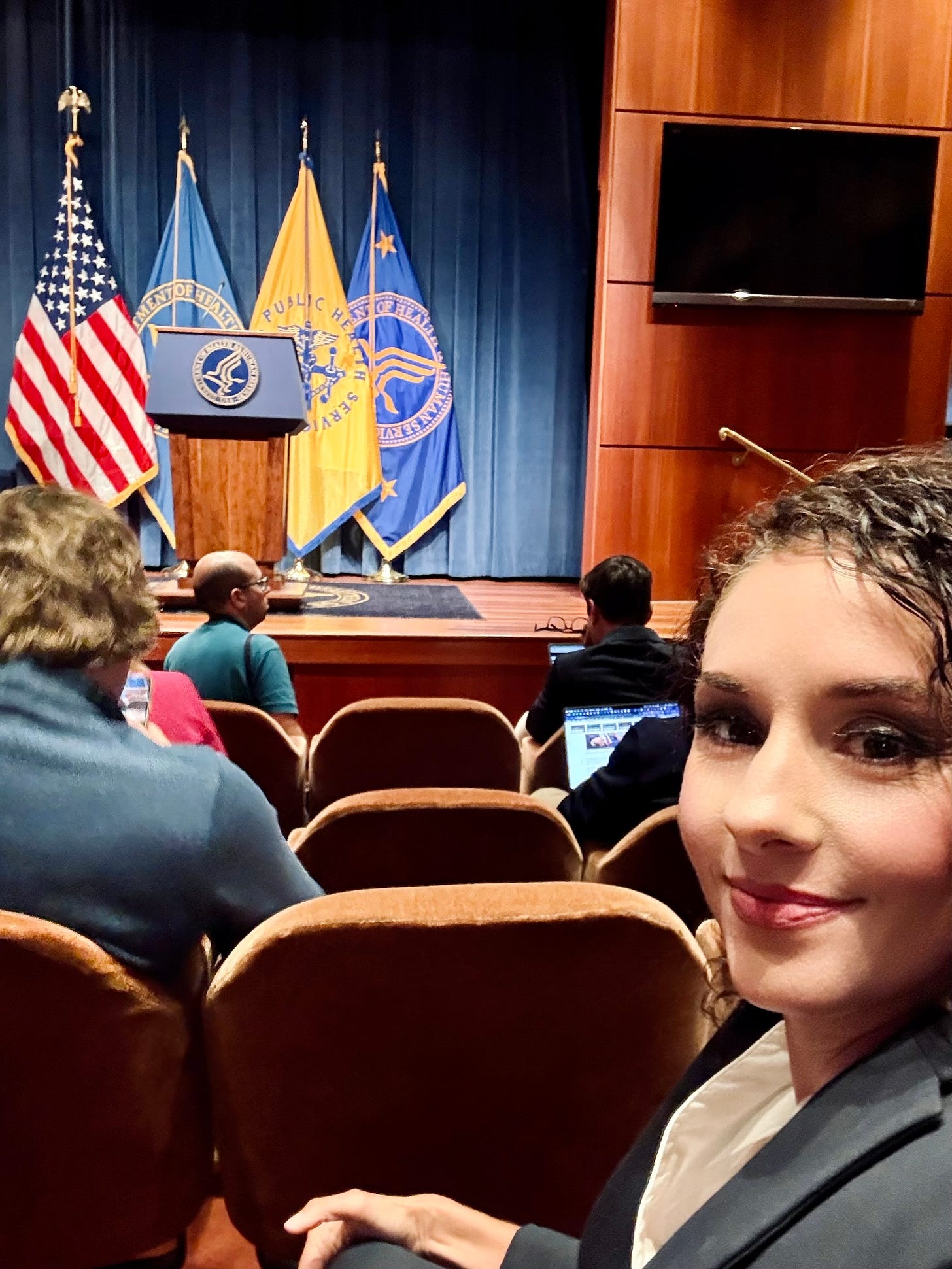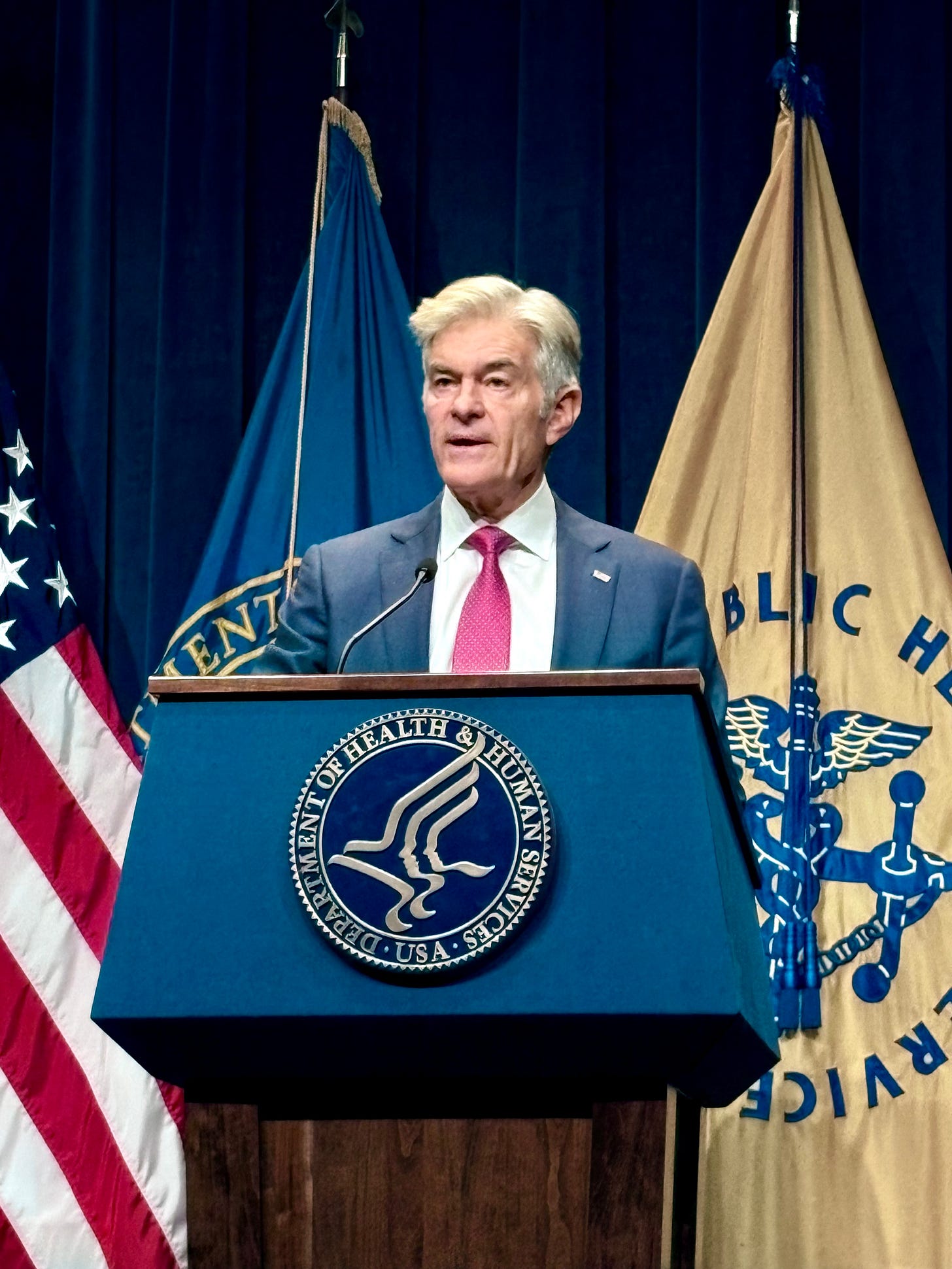Strangers Are Deciding Whether You Live or Die
Yesterday I watched the government either make the dumbest healthcare deal in Washington history- or set the perfect trap for insurance companies.
When Dr. Oz asked everyone affected by prior authorization to raise their hands, most of the room acknowledged having been burned.
"Reflective of the national average," he said, as if 85% of Americans being denied medical care by strangers was perfectly normal.
Because, well, I guess it is now.
I was sitting in a government press room that felt more like a 1960s theater- warm lights, velvet chairs, the kind of setup that makes you wonder if someone's secretly showing old movies on Friday nights.
Outside, D.C. was cooking at 101 degrees. Inside, maybe 30 people, including the usual suspects from major media outlets.
Avoiding eye contact I tried hard not to expose myself as the Independent journalist in the room.
The irony of the situation hit me hard.
In minutes we'd be discussing Americans dying while waiting for insurance approval, but before the cameras rolled, it was just another day at the office with reporters casually making small talk.
Until phones came out, chat turned to whispers and Administrator Oz stepped to the podium to deliver what could prove to be the start of a new chapter in health policy history.
Fact check: Prior authorization hurts more than it helps.
Before we dive into what happened, you need to understand what we're really talking about.
Prior authorization sounds bureaucratic. Boring. The kind of thing policy wonks argue about while normal people worry about real problems.
It's actually a system that decides if patients live or die- with better PR.
Here's the scam.
Your doctor (someone who went to medical school, completed residency, knows your medical history) says you need treatment.
A stranger who's never met you- and gets paid by your insurance company- says ‘no’
In 2023 alone, Medicare Advantage plans denied 3.2 million initial requests for care.
That's not including regular insurance. That's just Medicare Advantage.
Julie was 32 when her oncologist said she needed a specific chemotherapy drug immediately. Her cancer was aggressive, and timing mattered. The insurance company took six weeks to approve it while conducting their own "medical review."
By the time they said yes, her cancer had spread. She died eight months later.
Stephen, a dad with 4 kids under the age of 10, needed insulin. Not experimental insulin. Regular insulin. The kind diabetics have used for decades. His insurance company required "step therapy,"meaning he had to try cheaper alternatives first and prove they didn't work.
He went into diabetic ketoacidosis waiting for approval. His family found him unconscious in their apartment. He didn't make it to the hospital.
These aren't edge cases. They happen everyday.
It’s the system working exactly as designed.
Who is this supposed to be ‘helping’?
The administration pointed out that each prior authorization request costs doctors $35-45 to submit.
Back of the napkin math: there are about 3.2 million Medicare Advantage requests denied annually, but actually 50 million submitted in total.
*That’s upwards of 2 billion dollars.
Money that could go to patient care (or back in patient pockets) instead goes to fighting insurance companies.
Then Secretary Kennedy shared a story that made the room go silent.
A heart failure patient needed a transplant. Insurance approved the transplant, but denied the mechanical heart pump needed to keep the patient alive while waiting for a donor heart.
Yes, really.
They approved saving the guy's life, but not keeping him alive long enough to save it.
The medical team faced an impossible choice: Follow insurance company rules and watch their patient die, or save him and get sued.
They saved him. The insurance company sued.
"There are many situations where that ethical decision wouldn't have been made," Kennedy said. "People lose their lives because of prior authorization."
Is this what insurance companies call ‘healthcare’?
The Perfect Trap
Here's what I think really happened yesterday.
The Biden administration tried to regulate prior authorization and got bogged down in legal challenges and industry pushback.
So this team is trying something different:
Public commitments with specific deadlines, backed by the implicit threat of regulatory action.
They've gotten insurance companies representing 75% of covered lives in America (257 million people) to make public promises:
80% of authorization requests processed in real-time
No more prior authorization for routine procedures (yes, they currently require it for childbirth)
Standardized digital systems instead of faxes, paper and phone calls
Public dashboards tracking compliance
CMS Administrator Oz delivered the threat wrapped in Sunday School language:
"The meek shall inherit the earth. I always thought meek meant weak, but that's not what meek means. Meek means you have a sharp sword that could do real damage, but you choose to sheathe it for a while to do good."
Translation: We have the power to destroy you through regulation, but we're giving you a chance to fix this yourselves. For now.
It creates a no-lose scenario for the administration:
Either the insurance companies deliver and patients get better care, or they don't and the administration gets perfect justification for regulatory annihilation.
The 7-Month Countdown
The deadline for implementation is January 2026. Seven months.
If this works, here's what changes:
No more waiting weeks for approval while you suffer.
No more nurses spending entire days on paperwork instead of treating patients.
No more watching loved ones die from treatable conditions while companies ‘review files’
But here's the key insight:
Even if insurance companies only partially comply, the conversation fundamentally changes.
We go from "this is how healthcare works" to "why are we tolerating this?"
Why This Might Actually Work
I left that room feeling something I rarely feel covering healthcare policy: this might actually help.
Not because I trust insurance companies.
I don't.
But because of the real pressure applied in the age of social media.
Companies can fight regulations in court for years.
It's much harder to fight viral videos of cancer patients being denied care when you've publicly promised to fix the problem:
in a specific way
by a specific date
Kennedy's team seems to understand that trust in institutions is gone.
Americans are genuinely angry about healthcare. There's real political pressure building.
And public accountability hits differently.
My prediction: Some companies will comply because it's easier than fighting. Others will test the administration's resolve and discover what happens when they do.
In the meantime,
Social media outrage will continue driving patients toward alternatives like direct primary care and insurance alternatives like CrowdHealth
The Bottom Line
For the first time, I watched government officials admit that prior authorization isn't a policy disagreement- it's institutionalized cruelty with a profit motive.
But the question isn't whether this will fix American health insurance completely. It won't.
The question is whether we just watched the beginning of the unraveling of a system that puts paperwork over patients.
Either insurance companies just got the deal of a lifetime in the form of some positive press and 7 months to voluntarily reduce their most profitable mechanisms their way.
Or they just agreed to publicly shine a light on their own failures before the government destroys them.
We'll find out which one soon enough.
Until next time,
Tiffany
The author is an emergency medicine physician associate turned patient advocate and independent healthcare communications & policy writer.
*Edited to include the TOTAL costs paid by clinical practices preparing more than 50 million prior authorizations for Medicare Advantage annually. Thank you to @realdocspeaks for pointing that out!
If this message made you think consider sharing with a friend or on socials.









This is exciting. And I agree with your prediction- the specific action plus specific timing plus the right people saying it - there is absolutely a line in the sand now. Excellent reporting, and thank you for the excellent reporting. -Richard.
Good info thanks! Appreciate the crowdhealth referral too for future reference.